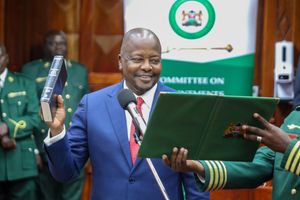
Cabinet nominees Mutahi Kagwe, Lee Kinyanjui and William Kabogo.
Many memorandums challenging three Cabinet secretary nominees were rejected by Parliament because they failed to meet the legal threshold.
Statistics show that only four of the 46 memorandums received met the threshold as set out in section 6 (9) of the Public Appointments (Parliamentary Approval) Act, 2021.
The section provides that “any person may prior to the approval hearings and by written statement on oath, provide the clerk with evidence contesting the suitability of a candidate to hold the office to which the candidate has been nominated.”
The CS nominees vetted on Tuesday are Mr Mutahi Kagwe for the Agriculture and Livestock Development docket, Mr William Kabogo (Information, Communications, and the Digital Economy) and Mr Lee Kinyanjui (Investments, Trade, and Industry).
Sources within the committee told the Nation that some memorandums were also rejected as they contained general accusations against the candidates without any supporting evidence.
Others were also not accompanied by sworn affidavits as required by law while some issues raised had been resolved either in court or by other government agencies, hence could not be put forward to the candidates again.
Article 118 of the Constitution provides that Parliament shall facilitate public participation and involvement in the legislative business and other business of Parliament and its committees.
Section 6 (4) of the Act further provides that the clerk shall notify the public of the time and place of holding an approval hearings at least seven days prior to the hearings.
Mr Kagwe received the highest memorandums contesting his nomination, according to statistics released by the committee on appointments.
The summary shows that 16 memos were towards Mr Kagwe’s nomination— one more compared to those of Mr Kabogo and Mr Kinyanjui who each received 15 memos against their Cabinet admission.
Out of the 16 memorandums received contesting Kagwe’s nomination, only two were compliant, 13 were non-compliant, with only one supporting the former Health CS for the new position.
Memorandums opposed to Mr Kagwe’s nomination accused the former Nyeri senator of not being patriotic when he was appointed as Health Cabinet secretary to execute and implement the World Bank on Covid-19
“Therefore, his loyalty was not to Kenya or the people of Kenya but foreign entities,” reads one of the memorandums.
Another memoranda by Joseph Enock Aura says that due to Mr Kagwe’s role during Covid-19, many Kenyans suffered death and irreversible injuries to their health after vaccination.
Mr Kagwe has also been accused of enforcing irrational lockdowns and school closures, a matter which was challenged in a constitutional petition 2189 of 2020
“The nominee had a tainted experience and breached the law when he was the Cabinet Secretary for Health. The nominee was responsible for financial impropriety and unexplained loss of taxpayers’ money when he was in charge of the ministry of health and therefore breached Article 201 (d) of the Constitution,” reads the memoranda.
The nomination of Mr Kagwe has also been opposed on account that he enacted Covid-19 regulations without public participation during his tenure as the CS Ministry of Health.
“The nominee purported to enact regulations on Covid-19 without Parliamentary approval contrary to section 5A and 11 (1) as read together with section 11(4) of the Statutory Instruments Act,” reads the memorandum
The procedure of arriving at Mr Kagwe as the nominee for the agriculture docket was also questioned in the petition which termed it as flawed.
For Mr Kabogo, out of the 15 memorandums received contesting his nomination, only one was compliant with section 6 (9) while 13 were found to be non-compliant and only one supporting the former Kiambu governor.
Mr Kinyanjui also received 15 memorandums against his nomination, out of which only one supported his candidature as the next CS for f Investments, Trade, and Industry the document shows 13 out the 15 were rejected while only one was admissible having complied with the law.
For Mr Kabogo and Kinyanjui members of the public raised the question of gender balance, regional balance and ethnic diversity in the nomination of the three Cabinet secretaries.
“Given the current composition of the Cabinet, the appointment of the nominees would violate Articles 27 (8) and 130 (2) of the Constitution as it does not reflect gender balance, regional balance and ethnic diversity,” reads one of the memoranda by Shallet Kibet.
The public through the memorandums also pointed out that the approval and subsequent appointment of the three nominees would breach Articles 10 (2), 21, 27 (6) and 54 of the Constitution as regards to the States duty and responsibility towards persons with disability.









